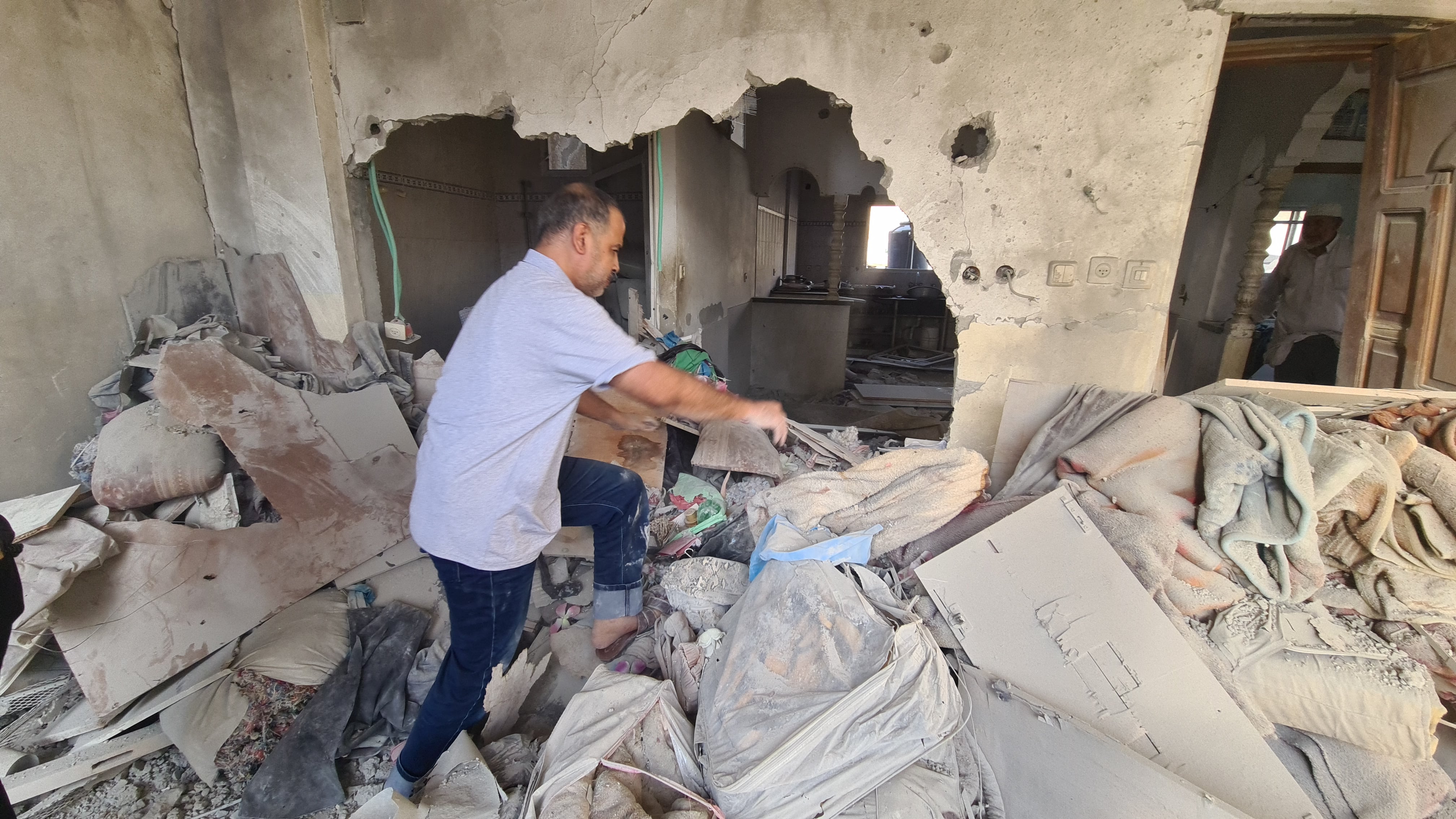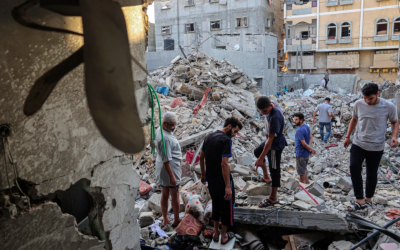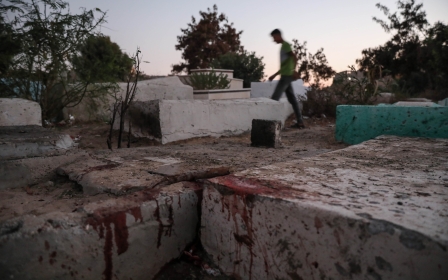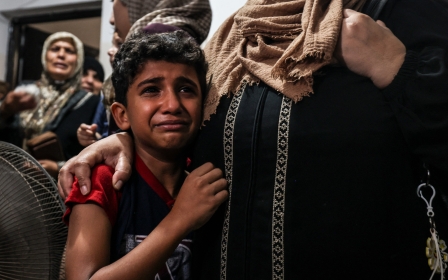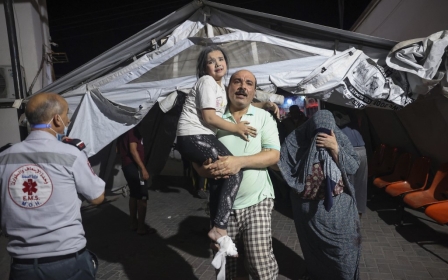Gaza: How ordinary Palestinians pay the price of Israel's assassinations
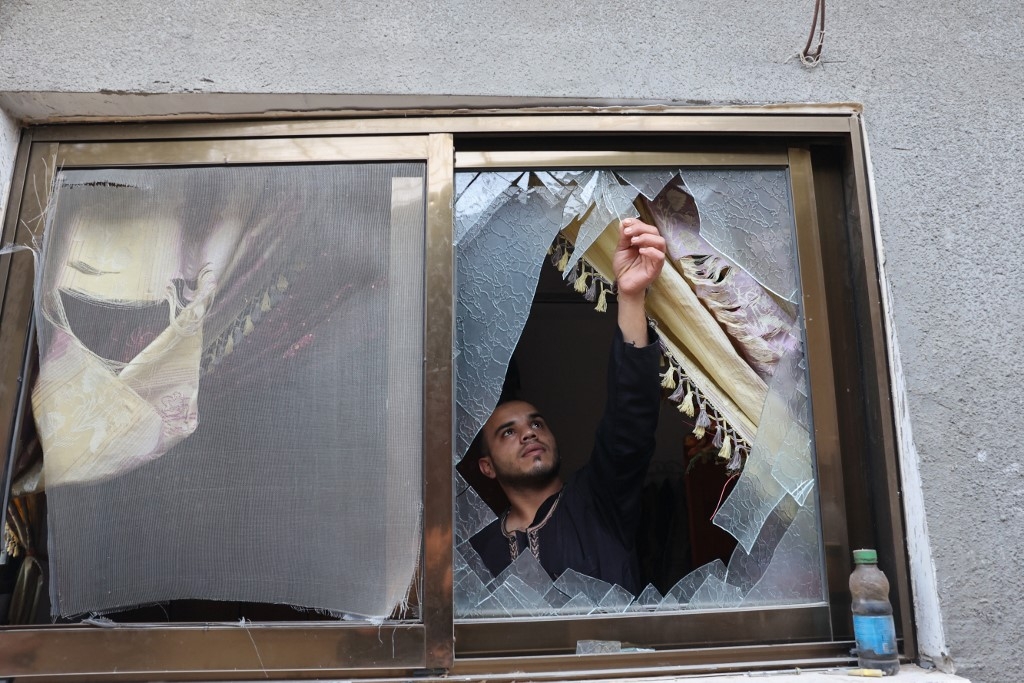
Leen Matar was playing at her grandparents’ dilapidated home when an Israeli air strike hit their neighbourhood in the Rafah area of southern Gaza on Sunday.
The 11-year-old resident of an overcrowded refugee camp was trapped in the adjoining three-storey building, before the neighbours managed to break the door down and rescue her.
"Suddenly, the ceiling fell on us. We started crying and I hugged my aunt who was injured. We were calling our neighbours to rescue us, but the door was above us,” Matar, lying on a bed at the Abu Yousef al-Najjar Hospital in Rafah, told Middle East Eye. “A few minutes later, the [neighbours] came and rescued us."
"Thank God, my injury is stable, but I am shocked and scared."
The air strike targeted an adjacent house on Sunday, killing eight Palestinians, including Khaled Mansour, commander of the southern division of the al-Quds Brigades (Saraya al-Quds), the military wing of the Palestinian Islamic Jihad movement (PIJ), and two other PIJ fighters, Ziad Ahmed al-Mdalal and Rafat Saleh Sheikh al-Eid, as well as a 14-year-old child and three women. Fifty other Palestinians were wounded in the attack on the densely populated neighbourhood.
New MEE newsletter: Jerusalem Dispatch
Sign up to get the latest insights and analysis on Israel-Palestine, alongside Turkey Unpacked and other MEE newsletters
Sitting next to her in the hospital room, Matar’s father, Wael, said he was trying to help her decompress from the stress on the third day of the attack. So he allowed her to go to her grandparents’ home.
"[She] visited her grandmother to have fun. But the house is adjacent to the bombed one. [When the attack took place], the asbestos of [her grandmother’s] dilapidated house fell on them."
Trapped under the rubble
Their neighbour Wesam Jouda, 39, was playing with his children when the raid struck the residential neighbourhood.
"I was trying to have fun with my children to make them forget their fear. Suddenly, without any prior notice, many consecutive missiles flattened five or six houses [in the neighbourhood],” he told MEE.
“The asbestos roof [of the house] and a wall fell [on us]. My children were shouting, I took them along with my wife and other neighbour's children to a safe place out of the neighbourhood, and then returned to [help] other neighbours."
'They asked me to allow them to demolish my house to enable the bulldozers to reach the targeted place to pull out the people trapped [under the rubble]. I agreed without thinking'
- Wesam Jouda
When he returned to the neighbourhood, the civil defense crews had arrived, but they were unable to reach people trapped under the rubble next to Jouda’s home.
"They asked me to allow them to demolish my house to enable the bulldozers to reach the targeted place to pull out the people trapped [under the rubble]. I agreed without thinking. The most important thing for me was the safety of the people under the rubble," added the unemployed father of five.
Standing on his home’s debris, Jouda did not regret his decision.
"These are my neighbours. How could I hesitate to do so? They have always rushed to help out on any occasion, I should help them.”
His family is currently staying at a relative’s home until they find an alternative.
“Our homes were demolished and many people are now homeless. This will continue until I find a place to rent,” he added. “We [just] want to live in peace."
According to the Palestinian Ministry of Public Works and Housing in Gaza, 88 housing units were rendered uninhabitable because of the attack, including 18 that were completely demolished and 71 others partially destroyed. Another 1,675 housing units were damaged.
Ahmed Temraz, a resident of the same neighbourhood, assisted the civil defense crews in pulling out neighbours trapped under the rubble.
"When I heard the raids after the al-Isha prayer [the fifth prayer of the day], I rushed to the place. Women, children, youth and elderly people were shouting, and the wounded and martyrs were trapped under the rubble,” he said.
“We started removing rubble with our bare hands, shovels and mattocks. The scene of pulling the dead bodies out from under the rubble was terrifying."
Temraz said the ambulances and civil defense crews arrived at the scene around 20 minutes later, but it took the bulldozers two hours to be available after responding to other rescue calls.
“We pulled out the last trapped body at around 5.30 am."
Due to a lack of supplies and rescue equipment, the civil defense crews in the blockaded enclave faced difficulty responding to the overwhelming number of rescue calls during the military offensive.
The three-day-operation, initiated by Israel on Friday, resulted in the deaths of 44 Palestinians, including 15 children and three women. Another 360 were wounded, including 151 children and 58 women, according to the Gaza Ministry of Health.
‘Illegal, immoral, irresponsible’
The unprovoked attack was launched to deter the PIJ in Gaza, according to Israeli officials.
But the disproportionate air strikes triggered condemnation from the international community, including United Nations (UN) officials and bodies.
“I condemn Israel's air strikes in Gaza to allegedly 'deter' Islamic Jihad's possible retaliation for its leader's arrest. As International Law only permits the use of force in self-defence, Operation Breaking Dawn is a flagrant act of aggression.” said Francesca Albanese, the UN Special Rapporteur on the situation of human rights in the Palestinian territories occupied since 1967, in a tweet.
Albanese described the operation as "illegal, immoral, and irresponsible".
Salah Abdul Ati, director of the International Commission to support Palestinian People’s Rights, said the attack was a “war crime” committed “without any justification”.
“It is a massacre against civilians. The pretexts of targeting one of the resistance fighters in a civilian place means that the occupation does not consider the principle of humanitarian necessity."
Abdul Ati argued that, according to international humanitarian law, members of armed factions who take no part in hostilities and who, while they reside in the zones, perform no work of a military character, are considered civilians and therefore are protected under international law.
"This proves that the occupation doesn't care about human rights or the International Humanitarian Law."
Middle East Eye delivers independent and unrivalled coverage and analysis of the Middle East, North Africa and beyond. To learn more about republishing this content and the associated fees, please fill out this form. More about MEE can be found here.


